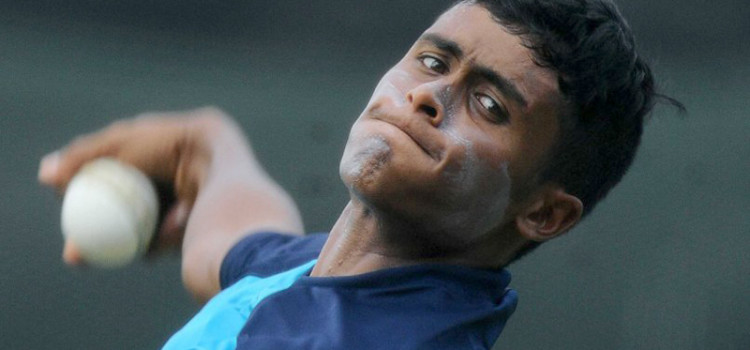
Zimbabwe succumbed to dot ball pressure – Vandersay
Jeffrey Vandersay, the Sri Lankan leg spinner, spent 324 days between his third and fourth One-Day Internationals only to see the game, Sri Lanka’s last in the league phase, get washed out. Another opportunity to make a mark came on Sunday (November 28) in the tri-series final against Zimbabwe and the 26-year-old shone through with a three-wicket haul that
paved the way for Sri Lanka’s title triumph.
Under helpful conditions for the spinners, Vandersay ended a 53-run stand between Craig Ervine and Tarisai Musakanda and instantly accounted for the former. He would go on to add the wickets of Musakanda and captain Graeme Cremer as Sri Lanka restricted the hosts to a paltry total of 170, which they then chased down in under 38 overs.
The affable young spinner was happy to get an opportunity to showcase his abilities on a tour that was looked at as an auditioning and talent-spotting exercise.
“Personally, I’m happy that I was able to play today and get a few wickets. It’s been a good series,” Vandersay said. “Even the first game that I got with Zimbabwe, when it was rained off, it looked like a turning wicket.
Today, of course we saw so much turn, so it was definitely the right track for me to play on. I’m really happy that we won the series, first of all.
“Players like Kusal Mendis, Dhananjaya de Silva, even Asela Gunaratne, they’ve been performing consistently. The younger guys have shown some maturity, and done really well in the series. It is quite a satisfactory feeling for us as a team. We lost Angelo Mathews and Dinesh Chandimal before this series, and they’re consistent performers. To see our guys
putting their hands up and performing well for the team, without some of the seniors being here, is quite satisfying.”
Vandersay however conceded that Sri Lanka may have opted to bat first, like Zimbabwe did, had they won the toss. The spinner though attributed Zimbabwe’s low score to effective pressure building by the team’s bowling unit.
“We wanted to bowl second, mainly because we thought it was going to spin in the second innings,” Vandersay said. “That’s what we were thinking. So I’m not surprised Zimbabwe took that decision, batting first.
“It was not only [my wickets], but the quick sessions we bowled where wickets were falling regularly. We kept it going, kept building up the dot balls, and that built pressure.”
Zimbabwe captain Graeme Cremer rued his side’s batting failure in the final hurdle of the tri-series against Sri Lanka where they finished runners-up.
Zimbabwean batsmen couldn’t take advantage after Cremer drew first blood in the summit clash by winning the toss and opting to bat first.
The hosts lost half their side with less than 100 runs on the board, and despite Sean Williams’s best efforts there was no room for a revival. “In hindsight, we probably could have bowled first,” Cremer conceded in a post-match press conference on Sunday.
“But the way it looked this morning, we thought it would only get worse or stay how it was. The wicket was a bit sticky this morning, so it took a lot of turn. But it looked really good to bat out there this afternoon. It’s just one of those things. We couldn’t predict that.”
Despite admitting, on hindsight, that he could’ve made a different decision at the toss, Cremer was quick to note that the wicket wasn’t a batting paradise, but needed better application from his batters. “It wasn’t a 300 wicket by any stretch of the imagination. We could have got to 240 or 250 if we’d batted a bit more sensibly, and if we’d done that it could have been a different story today. We’ve got to move on and take the good part of the series with us, and learn from the things that we didn’t do so well, and make sure we don’t repeat them in the future.”
Defending 160, Zimbabwe always had their backs to the wall. However, the plucky nature that carried them to the final of the series, helped them keep their shoulders from dropping.
“When we went out there, we said even if they get our score one wicket down, we’ll make it as hard as we can for them. We weren’t going to go searching for the wickets, but we wanted to put them under pressure and make it the hardest 160 they’ve scored. That was our goal,” Cremer said.
Categories: Cricket



